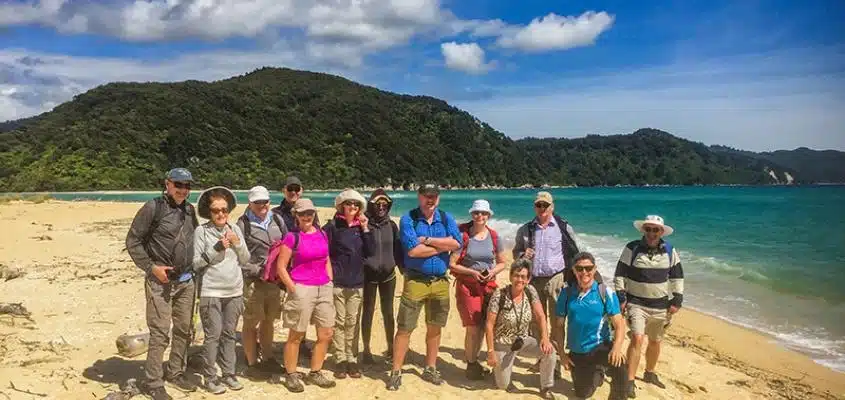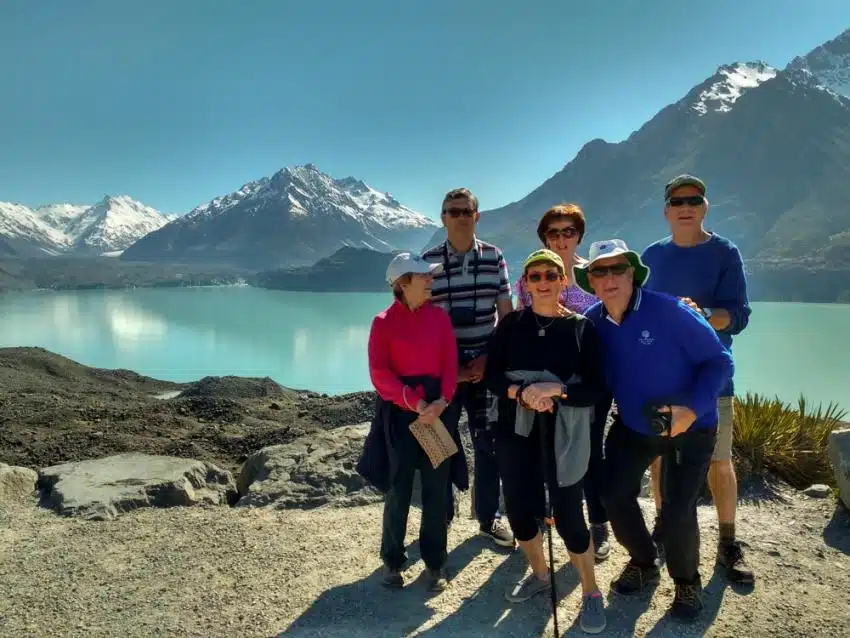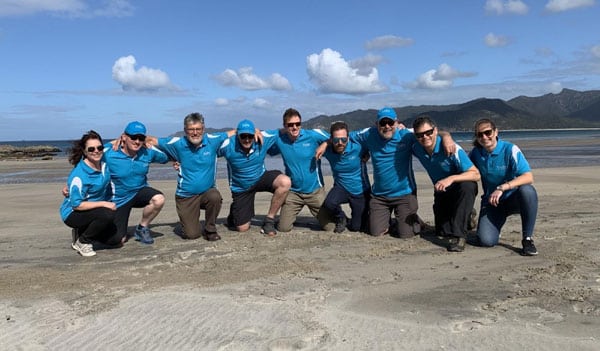Tipping in New Zealand – the complete guide for visitors. If you’re planning on visiting this wonderful country and want the definitive guide to who and how much to tip, you’ve come to the right place. By the end of this article, you’ll know as much as anyone about how to tip in New Zealand.
New Zealand might be at the edge of the world (depending on your point of view) but it’s one of the most westernised and modern countries in the world, with a strong economy and forward-thinking people. Let’s just say that, as globalization’s effects touch more and more of the world, New Zealand is riding the crest of the wave. But old habits die hard. The act of tipping, an (almost) globally recognised way of compensating service workers, has traditionally been resisted by Kiwis. It was once unheard of in the country but the concept of gratuities is gaining traction.
Is tipping expected in New Zealand?
The quick answer is no. Tipping is not expected in most situations. However, as with most things in life, it’s not that simple. Many people ask us if it’s impolite to tip or they wonder how much to tip when they feel the urge to do so. Before you open your wallet or purse, it’s important to know where tipping is accepted and where it’s not.
If you take just one thing away from this article, remember that service staff don’t rely on tips to get by and no-one will be upset or chase you out the door if you don’t tip. If you do tip it will be welcomed and appreciated by most people.
Where to tip in New Zealand? (and where it’s not expected)
Tipping in the service industry is not nearly as common as it is in countries like the US and Canada. Service workers receive a wage that allows them to survive without “donations” from customers or clients. A tip in New Zealand is regarded as a sort of award for outstanding service.
If you’re not happy with the service or the waiter was grumpy, you can choose not to leave a gratuity. Nobody will say anything and there’s no need to feel embarrassed about this.
Tipping in restaurants is becoming more common in recent years partly thanks to the influence of US movies and culture. Whether you agree or disagree with this is a different question. But it’s important to know that workers do not rely on tips to supplement their wages.
Occasionally, you might see tip jars on counter tops in stores or restaurants. Customers drop coins (and even notes) in these jars as a “thank you” to the staff. Dropping a coin should never be performed ostentatiously. As a rule, be discreet when tipping and don’t expect a round of applause or a cheer.
When paying for services there’s no need to calculate a percentage of the cost. You don’t have to figure out 10-15% of anything and even if you want to leave a tip, a small amount will suffice.
Just ask yourself if the service went above and beyond your expectations. Read on to learn how much you should tip.
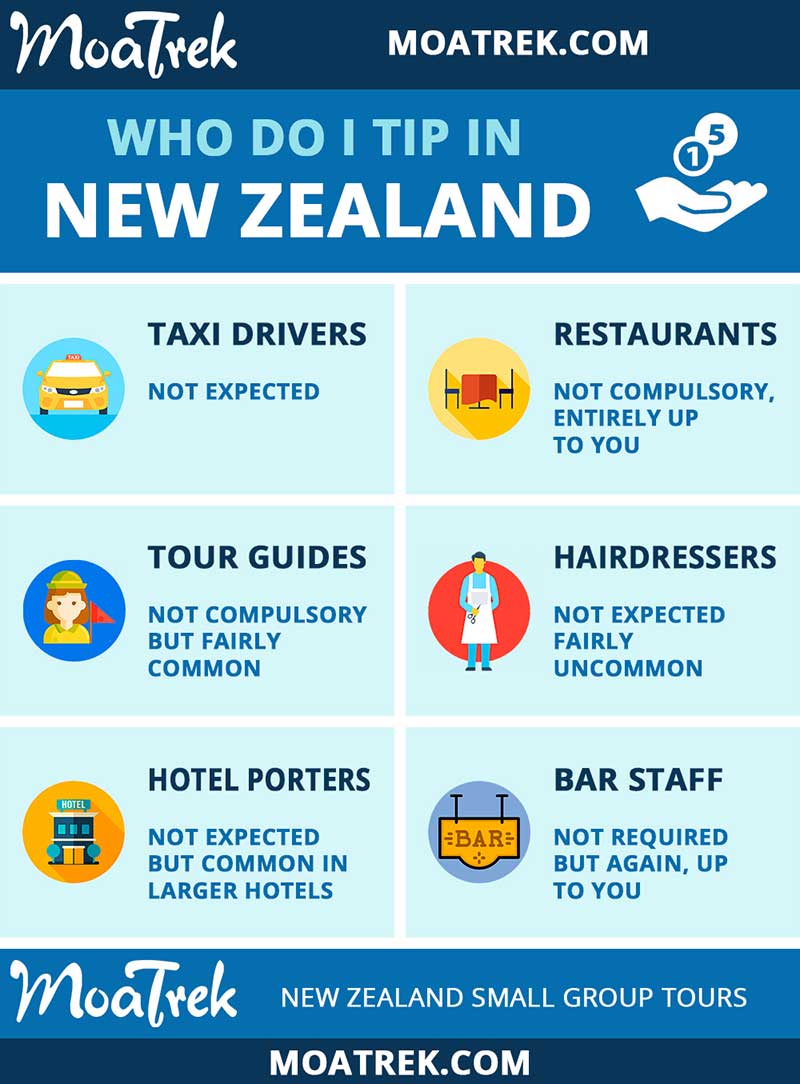
Who do I tip in New Zealand and how much?
To be clear, a tip of 10% of the bill is a good tip in New Zealand. Offering this amount is a sign that the service was truly excellent.
Restaurants
The level of service that waiters provide is not determined by the expectation of a tip. Waiters receive a fair wage and work for this alone. Tips are seen as a small bonus but New Zealanders do not generally tip. In more touristy areas, waiters will receive more but there’s no obligation to leave money on the table.
It’s quite common nowadays to see an extra space for a tip on credit card bills and it can be a little uncomfortable to have to make that decision with the waiter standing right there! A Kiwi perspective on this would be if you felt the service was outstanding and the staff went out of their way to make your experience special, then a tip of up to 10% would be appropriate. If you felt it was the standard you expected and there was nothing that really seemed above your expectations then a Kiwi wouldn’t tip.
Tour Guides & Drivers
Many visitors to New Zealand enjoy bus and coach tours for their personalised attention, safety, and comfort. With travellers coming from all over the world these days, many guests do give tips to the tour guides and crew. These gifts are a way of saying thanks or complementing the staff on a job well done. But in reality, tour staff do not depend on tips. Some foreign tour operators might encourage the giving of gratuities to cover for low wages but high quality New Zealand owned tour companies will not do this. Tour staff are generally fairly compensated for their work and most love what they do.
How much should you tip a tour guide in New Zealand?
We’ll take a little time to answer this one clearly, as many of the readers of this article will be coming to New Zealand on one of our small group tours and would appreciate some guidance on this.
First of all, we’ll repeat the mantra that if you don’t tip in New Zealand then nobody is going to be upset or think poorly of you. But say you’re on a 14 or 21 day tour, you’ve had a great time and think your guide did an outstanding job, how much should you give?
A useful rule of thumb is to imagine that everyone in your group gave the same amount, how would this total be for the guide? Don’t go round and ask everyone if or how much they’re going to give, just imagine for yourself. Say you were on a 2 week tour, there are two of you and you’re thinking of tipping $100 each. If there are 15 people in your group the guide would get $1500 extra income for the two weeks. The average weekly wage in New Zealand is around $1000 so this would equal a week and a half’s wages, not bad.
The longer your trip then the more you would tip. If you were on a 3 week trip you might want to tip a little more, say $150 per person. Talking to a few of our guides, they tell us that tips can range from zero through to several thousand dollars per trip. But they all said every trip is different and if someone doesn’t tip then no problem.
If you’ve been on a longer trip with a group of people you may want to pass a card around the group to say thanks to the guide. This is fairly common practice on multi day tours and gives everyone the chance to discuss “a tip” if you want to. Guests tend to give tips individually, not collectively, but it can help to talk to your other travellers to gauge what others are doing.
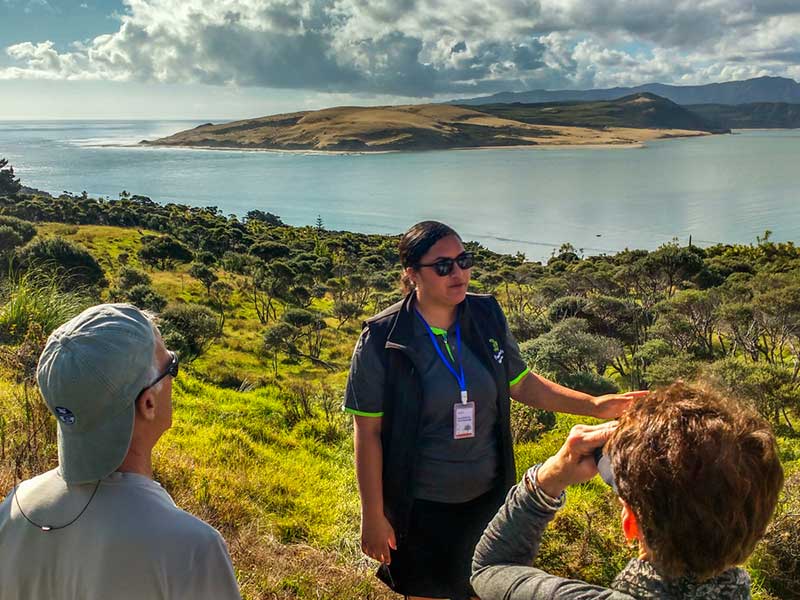
Quick Reference Chart for tipping in New Zealand
| Who to tip | Average tip | Great tip |
|---|---|---|
| Tour Guide (eg 14 day tour) | $100 per person | $200 per person |
| Porter / Room Service | $1 - $2 | $10 |
| Concierge | $0 | $10 - $20 |
| Room Cleaners | $0 | Up to $5 per night |
| Taxi Driver | $0 | Round up to nearest $1, $5 or $10 |
| Waiter | $0 | 10% |
| Bartender | $0 | $10 |
| Buffet Restaurant | $0 | Up to you |
| Takeaway Restaurant | $0 | Up to you |
| Bus Driver | $0 | Up to you, guides will often share tips with drivers |
| Valet | $1 - $2 | $10 |
| Hairdresser / Barber | $0 | Round up or leave change. |
| Food delivery | $1 - $2 | $10 |
Hotel Porters & Concierge
In almost every country in the world, tipping the concierge and the hotel bellhop is customary. You can tip the porter a dollar or two (up to $5) for bringing your bags or room service. It’s fairly uncommon in New Zealand to tip concierge or front desk staff just for giving you information or directions.
Hotel and apartment cleaners
There’s no need to tip the person cleaning your room. Don’t feel obliged to do so but as in most countries, cleaning staff are not highly paid so the universal method of leaving a few dollars in your room on checkout for the cleaning staff is fairly common nowadays.
Bars
Even bartenders, members the profession (or side gig) most associated with tipping, do not expect tips. If you’ve spent the evening chatting with an attentive, entertaining, and polite bartender, tip them the price of a single drink. However, Kiwis do not tip bartenders as a rule.
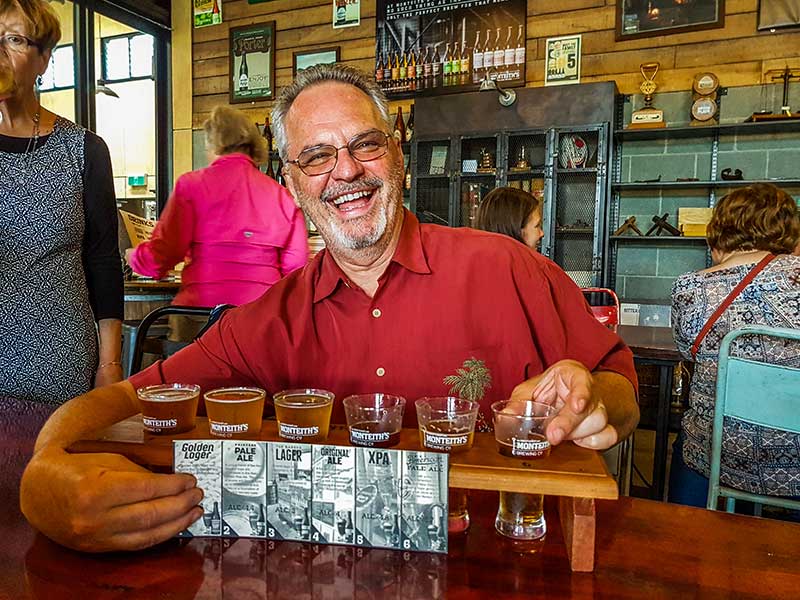
Taxis
Taxi drivers do not expect a tip and may act surprised if you offer one. On shorter trips, a quick rule is that if you’re paying with cash, round up the number to the nearest $1, $5 or $10. As in many countries, letting the driver keep your change is a universally accepted way to tip and will be appreciated.
Uber has recently started to encourage New Zealanders to tip their drivers. This has received backlash from locals who believe that a large multinational company should not try to change local customs and culture, especially if the company aims to benefit from these gratuities too.
If you’re using an app like Uber, you can choose to leave a small gratuity after the taxi ride. 1-5% is more than enough. Round up any fares to the nearest dollar on your app.
Hair & Beauty
In some countries, tipping your hairdresser is common practice but in New Zealand, adding a tip for a haircut is not common. If you think your barber or hairdresser did an excellent job then leaving your change or rounding up the bill would be accepted with a smile.
What’s the best way to hand over my tip?
The best thing to remember is New Zealand is a country that doesn’t like ostentatious and showy displays of wealth. We welcome visitors to New Zealand from all over the world and we’ve seen it all, from very loud and obvious handover of a wad of cash in front of everyone, to the subtle envelope passed over discreetly or even left somewhere safe for the person to pick up.
If you want to give a tip to your guide on one of our trips, then pick a moment you can talk to them and hand over your tip in a little envelope or card. That way the guide will know exactly what’s happening but not be forced to deal with loose notes. The guide and others in your group will appreciate a little discretion around the amount.
The Maori Tradition of Koha
The indigenous people of Aotearoa (New Zealand), the Maori, have a strong identity and culture. Despite frothy beginnings between Maori and the first European settlers, Maori culture is now enjoyed and celebrated by all New Zealanders.
Visitors attending a Maori event may be expected to give koha. Koha is a kind of donation by the visitor to a Marae (a local Maori meeting house and grounds). It’s a way of supporting the organisers and helping to pay for the running costs. In the past, the size of the koha showed the respect the visitor had for the local community or person who welcomes them.
Traditionally, the amount given was at the discretion of the giver – you give as much as you like or can afford. The monetary value was less important than the act of giving, which shows respect. Koha was originally a physical gift in the form of food, precious materials, or crafts, but in modern times, is more likely to be a monetary gift or donation.
If you get invited to a marae, it’s important to understand what’s expected. If you’re concerned about making a cultural faux pas, visit the marae or event with a guide. They will negotiate the entire thing while you enjoy the experience. Touristic shows do not have the same rules for koha
If you want to give a tip to your guide on one of our trips, then pick a moment you can talk to them and hand over your tip in a little envelope or card. That way the guide will know exactly what’s happening but not be forced to deal with loose notes. The guide and others in your group will appreciate a little discretion around the amount.
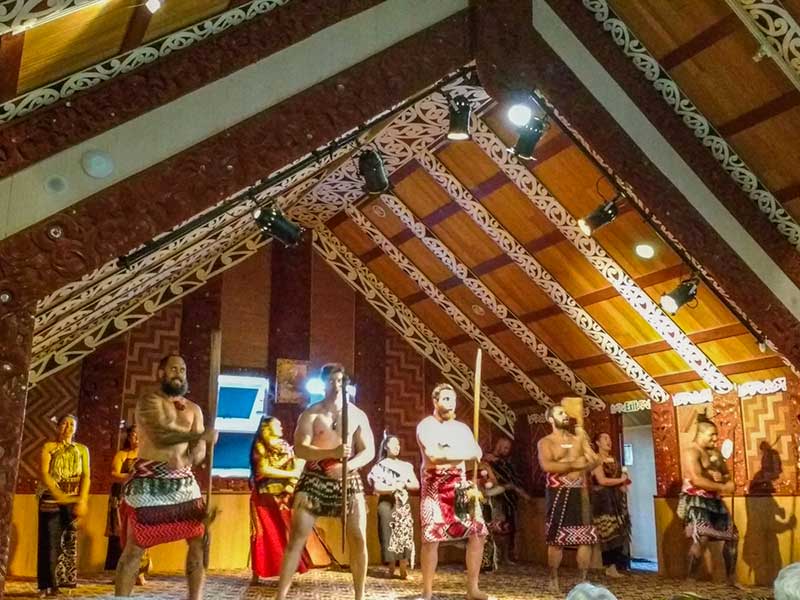
Don’t be surprised if someone refuses your tip
Visitors are sometimes taken by surprise when New Zealanders react with a less than enthusiastic response to a tip. Don’t worry! It’s a cultural thing. The main point to remember is that if someone refuses a tip, it’s best not to insist. Older people are less likely to appreciate the culture of tipping that people from other parts of the world are accustomed to.
You’ll soon discover that Kiwis are a relaxed bunch with a great sense of humour. They don’t take offence and are hard to faze. “Chilled out” might be the appropriate term. If you have concerns or doubts about tipping, just ask someone for help. That someone might be your tour guide, a waitress, or someone in the street. Locals like to help visitors understand the local ways and you won’t be breaking any cultural taboos by showing an interest.
If in doubt, don’t tip. If it’s something you want to do, make a discreet moderate value tip. Minimum wage laws and local customs dictate that gratuities are not expected and in some cases, unwelcome. Read an opinion piece from a local newspaper talking about how tipping is “not welcome in New Zealand”!
We hope this is a helpful introduction to tipping in New Zealand for anyone planning a trip down to see us soon. We’re MoaTrek and we’ve been running small group tours here since the early 1970s and love nothing more than helping visitors make their New Zealand dream holiday a reality. If you have any New Zealand travel questions or would like to find out more about our tours get in touch with one of the friendly team now.


